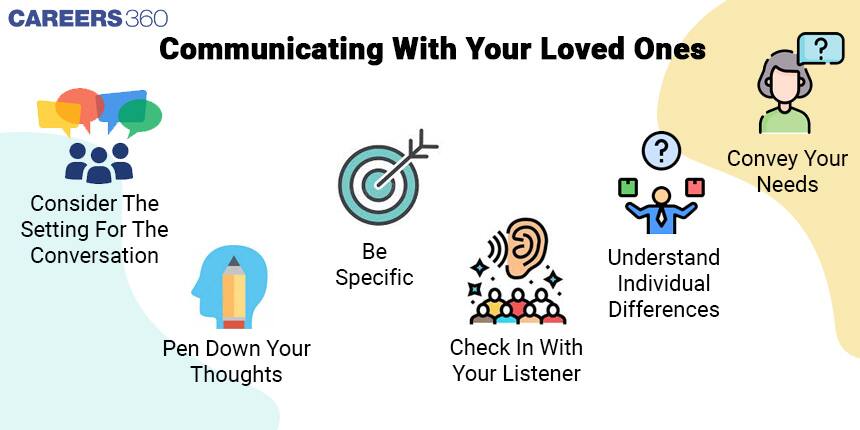7 Tips To Convey Your Struggles To Your Loved Ones
There comes a time in everyone’s life when we aren’t okay; we might be struggling emotionally, psychologically and/or mentally. More often than not, a challenge that stands in front of us, looming in our minds, is how to convey to our loved ones the state of our mind, of our crisis and silent struggles.

Despite the fear of judgement or the possibility of being misunderstood, our instincts as a social and pack animal rouses in us the need to speak to our friends and family about our state. We as humans seek and find great comfort, safety, and security in community and close relations.
Recognising Your Feelings
Try to get an understanding of what you mean when you say you’re not feeling so good. Sometimes we may not be sleeping or eating well, may not be hydrated enough or not getting enough sunlight, and this may be affecting the stability of our mood and our ability to manage challenges, thereby leading us to feel fatigued frequently, making us irritable or frustrate. We may perceive as mental health issue, when it may just be a passing problem, like the difference between a seasonal cough and a chronic problem of bronchitis. While other times we may perceive a genuine concern as a minor one.
In any case, it is important to get an understanding of what we may be going through. Speaking to a specialist will give you the necessary information you need to gain clarity.
Start by visiting a therapist and explaining your situation in detail; depending on the conclusion or diagnosis, the practitioner may refer you further to a psychiatrist or a physician.
Also Read | Coping Mechanisms You Should Develop To Deal More Effectively With Situations
Things To Consider Before Sharing
Many people think they may feel lonely in their distress and must therefore share it with their loved ones or that sharing the information may bring relief but these are not necessarily true.
So, ask yourself these questions beforehand—
- What are you hoping you will get out of this communication?
- Who are the people you would like to share this information with?
- How do you imagine they might respond? What are your expectations of their response? What happens if that doesn't match?
- How might this communication help you?
Communicating With Your Loved Ones
It will be a good idea to keep the following tips in mind while communicating your struggles with your loved ones.
 A key part of the communication process here is to convey how your loved one(s) can help you, support your journey, and be involved.
A key part of the communication process here is to convey how your loved one(s) can help you, support your journey, and be involved.
Consider The Setting For The Conversation
Don’t have these conversations in crowded places or cramped spaces. Make sure you and your loved one(s) have the space and freedom to emote freely. Make sure both you and your loved one(s) have time at hand to discuss at length if needed and neither of you have to rush for something else.
Pen Down Your Thoughts
If you feel you might be panicking or may mix up what you have to share, don’t worry. Simply take a sheet of paper and put down the key pointers of what you wish to cover. Feel free to make flow charts or tables if they help you summarise and communicate information better.
Also Read | 4 Things You Must Discuss With Your Counsellor
Be Specific
A conversation that is all over the place is often perceived as chaotic in the listener’s mind and this chaos spirals into the feeling of uncertainty, anxiety and fear. This applies not just to the listener but also to the speaker, i.e. fumbling and/or being all over the place or inarticulate may make us feel unsure and under confident and uncomfortable.
So, it is important that you take your time to prepare in order to be specific while communicating. Specificity elicits the feeling of control and agency and helps the listener as well as the speaker perceive the problem as being manageable.
Check In With Your Listener
Making space for questions, clarifications, and thoughts helps the listener feel more involved and valued. It also helps bridge the gap between you and your loved one(s). Furthermore, it helps them grasp the situation better and get clarity on how they can be a part of the solution.
Also Read | Is It Always Good To Be Positive?
Understand Individual Differences
It is important to understand that each individual responds, processes, listens, communicates and feels differently. Someone responding differently than what you had imagined does not make them an unsupportive loved one.
- Different individuals need to be spoken to differently. Some of our loved ones need information presented in a more emotionally-oriented manner while some require it to be more logically presented. Keeping in the mind these traits of your loved one(s) will help have more effective conversations.
- Different individuals will respond differently to what you say. Some will respond emotionally and ask more questions about how you feel while others will ask more logistical and objective questions.
Convey Your Needs
A key part of the communication process here is to convey how your loved one(s) can help you, support your journey, and be involved. Specifying what you may need helps the listener understand their role and responsibilities. It also helps you feel like you have strong support from the people around you and feel less like you're battling this situation alone.
Set Boundaries
Last but not least, and perhaps most importantly, it is key that if you don't feel comfortable, heard, misunderstood, or shamed in any way, feel free to and assert your boundary. You may say something like "I appreciate your concern/ thoughts/ opinions, however I am not in the headspace/ I don't have the mental bandwidth to respond to these. Perhaps, at a later time we can come back to this discussion".
In the end, what is most important is that you are your greatest supporter and that is what makes us resilient and overcome our challenges.
Nilanjana Parijat is a depth-oriented, and holistic wellness psychologist, with extensive hands-on experience in working with children, adolescents and families. She currently works with Reboot Wellness, Gurugram.